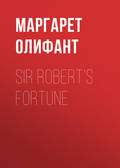
Маргарет Олифант
Merkland: or, Self Sacrifice
CHAPTER XIII
WHEN Anne entered Merkland after her visit to the nurse’s cottage, and was proceeding, as usual to her own room, she was stopped by Duncan.
“Miss Anne,” said Duncan, significantly, “Merkland is in the parlor.”
“Well, Duncan,” said Anne, “what of that? Does Lewis want me?”
“Na, I’m no saying that,” said the cautious Duncan; “but I just thought within mysel that maybe ye were wanting to see the Laird; and he’s in the parlor, and so’s the mistress. Mr. Lewis has been hame this half-hour.”
Anne comprehended. The clouds of the morning had broken into a storm, and Duncan, with whom “Mr. Lewis,” partly as a child of his own training, and partly as the Laird of Merkland, was a person of the very highest importance, and not to be teased and incommoded by “a wheen woman,” desired her interposition to receive the tempest upon her own head, and avert it from Lewis, as was the general wont, when Anne made her appearance in the midst of any quarrel between the mother and son.
“I will return immediately, Duncan,” she said, as she ran up stairs to take off her cloak and bonnet.
Duncan turned away satisfied.
“A wheen, silly, fuils o’ women, as they are a’, the haill sect o’ them,” he soliloquized, fretfully; “wearing the very life and pith out o’the lad, wi’ their angers, and their makings o’. First the one and then the other. Ane would need lang tack o’ patience that ventured to yoke wi’ them, frae Job himsel, honest man, doun to Peter Hislop, the stock farmer at Wentrup Head. ‘Deed, and the twa are in no manner unlike, when ane has a talent for similarities. They were baith rich in cattle, and had a jaud of a wife to the piece o’ them. Clavering, ill-tongued randies, wearing out the lives of peaceable men.”
When Anne entered the room, she found Lewis pacing back and forward in it, in haste and anger, while Mrs. Ross sat leaning back in her chair with the air of a besieger, who has thrown his last bomb, and waits to see its effect.
“I cannot believe it, – I will not believe it!” exclaimed Lewis, as Anne entered. “If it had been so, I should have heard it before. Oh! I know you could not have kept this pleasure from me so long, mother! and I declare to you that this stratagem – I say this unworthy stratagem – only strengthens my determination. Anne,” continued Lewis, perceiving her as he turned, in his hasty progress from one end of the room to the other, “you have heard this story – this phantom of Norman – the murderer, as he is called – which my kind mother has conjured up to frighten me. Join with me in telling her it is not true – that we are not to be deceived – that we do not believe this!”
Mrs. Ross endeavored to toss her head as contemptuously as was her wont – it would not do; the motion was spasmodic. She was reaping the fruit of her own training, and the ingratitude and rude anger of her only son, from whom, indeed, she did not deserve this, stung her to the heart.
“Lewis,” said Anne, “you are behaving very unjustly to your mother. Be calm, and do not give way to anger so unseemly.”
“Oh! do not interrupt him,” said Mrs. Ross, “let him go on; it is pleasant to insult his mother.”
Lewis turned from her angrily.
“This is not a time for any absurd punctilio, Anne. Let me hear you say this is not true – this story – this scheme. I will not submit to it. Am I a boy, I wonder, that I am to be frightened by such a – ”
Mrs. Ross rose. The darling son – the only child – to turn on his mother thus!
“Lewis!” she said, her features twitching, her voice husky. “Beware!”
“Lewis!” said Anne; “I cannot bear this either; it is mere madness; sit down quietly and listen. Mother, I beg of you to sit down; forgive him this; he does not know – he cannot comprehend. Lewis, when your mother told you this very terrible story, she believed it true.”
Mrs. Ross had been regarding Anne, whose support she deserved as little as she did the insults of her son, with a face in which wonder and shame were strangely blended. Now she darted up a sharp, keen glance.
“Believed it true! This from you, Anne Ross – this from you!”
“Bear with me, mother,” exclaimed Anne; “and you, Lewis, be still and hear me. I believe with my whole heart that our brother, Norman Rutherford, is innocent of this terrible deed; but, in the judgment of the world, he is condemned long years ago. Every one thinks him guilty. Not your mother only, but Mrs. Catherine, and all who know the story, except myself and one other. Lewis, I do not say how unbecoming and unnatural this passion is, but your mother has only told you, what I have been eager to tell you through all these anxious months. So far as common belief goes, you have heard rightly.”
“But it is not true,” said Lewis, doggedly, throwing himself into a chair; “you admit it is not true. A scheme – a – ”
“Mother, leave this to me,” cried Anne, trembling as she saw the contortion of Mrs. Ross’s face. “It is no scheme, Lewis. You do us cruel wrong in using such a word. It is true in every particular, but in the one which has given it all its bitterness to me. It is not true that Norman is guilty. It is true, that for seventeen years – for all Alice Aytoun’s sunny lifetime – he has been expiating, in a foreign country, the crime of another man. Do not sneer, mother; I cannot bear it. Do not turn away Lewis; I will not be disbelieved. My brother Norman is innocent; the two hearts that knew him, and loved him best, have put their seal upon his truth, one bearing witness in the clearsightedness of nearly approaching death, the other cherishing it in her inmost heart as the one hope of her waning years. Lewis, here is your father’s latest words and testimony. Read it, and believe that it is true.”
“What is true?” exclaimed Lewis, starting up, without, however, taking the letters which Anne held out to him. “What is the meaning of all this, Anne? My mother tells me first, that this Norman killed the father of Alice Aytoun, and then you come in, and tell me all the story is true, and yet that Norman is innocent; what do you mean? I am not to be treated as a schoolboy. I shall not submit to these mysteries; tell me plainly what you mean.”
Anne looked anxiously at Mrs. Ross. “Have you told him all? Does he know all, mother?”
“I don’t understand you, Anne,” said Mrs. Ross, sullenly.
Anne stood between them, baited by both, her patience nearly breaking down. “Does he know all?” she repeated; “does he know that Norman is alive? Lewis, have you heard that?”
Lewis walked through the room hastily, and did not answer. He had heard it – it was clear; and Anne fancied that, like herself, the thousand apprehensions connected with that secret were overwhelming Lewis, that grief and fear for their unhappy brother were swelling up in his heart, too great for speech.
“Lewis,” she continued, “you ask me what I mean – I will tell you. This morning, and for many a sorrowful and dreary morning before this, I knew the history of Norman, as you know it now. I knew that the stain of a great crime was upon his name. I believed that Alice Aytoun’s father had fallen by his hand. I knew that justice had set its terrible mark upon him, and that the world thought him already dead; yet, all the while, I knew he was alive, still wandering, Cain-like, with his guilt and his condemnation upon his head. Lewis! since Alice Aytoun came to the Tower, this has haunted me night and day, waking and sleeping; it has tinged my every thought and every dream; it has never left my mind for an hour. You thought I wished to put obstacles between Alice Aytoun and you; you were right, I did so. I endeavored in every possible way to keep you separate. I schemed as I never schemed before; you know now the reason. I wanted to preserve you both; to save her young heart from this cloud, and to keep you even from knowing it, because it was your mother’s wish you should not know. Our plans are not the best, and Providence has mercifully baulked mine. Lewis, with you I am sure, as with me, the one circumstance in Norman’s calamity that makes it bitter, is the crime. What happened last night, driving me, as it did, almost to absolute despair, drove me also to exertion. And this morning, I found these precious letters – look at them, Lewis – which clear Norman, and which leave to us my father’s dying charge, to redeem the fame of his unjustly accused son. Lewis, take the letters; they are addressed to you no less than to me, and if we but discharge our trust faithfully, all will be well.”
Something moved by Anne’s earnestness, Lewis took the letters, and sat down to examine them. Anne threw herself, exhausted, into a chair; the mental excitement of the morning, and its sudden transition from despair to hope, had worn her out. Mrs. Ross glanced from the one to the other angrily, and cast keen glances at the yellow tear-blotted letters in her son’s hand. He had laid down his father’s cover, and was reading with kindred keenness, Norman’s incoherent self-defence. The young man’s sharp, cold scrutiny, was little like that of one, whose present happiness depended upon the truth of this; his steady hand, and business-like demeanor, revealed no deeper interest in that cry of agony, than if its writer had been the merest stranger, and not a much-suffering brother. Anne watched him also, with compressed lips, and anxious eyes; she thought his indifference firmness, or tried to think so, though very differently, she knew, that utterance of Norman’s distress had entered into her own heart.
He finished the letters; but there came no exclamation of hope or thanksgiving from the steady lip of Lewis. He folded them up carefully, and laid them on the table. Anne waited in breathless anxiety. “Well,” he said, coldly, “and what do you think you can make of these?”
“Lewis!” exclaimed Anne.
“Ah! I thought you would be disappointed. It’s not at all wonderful that you should think these letters could do a mighty deal of themselves, for you’ve no experience, you know nothing of the world; and yet, I thought you had better sense, Anne. They’re not worth a rush.”
Anne looked at him in amazement; she would not understand his meaning.
“They prove nothing – nothing in this world,” said Lewis, with some impatience. “An incoherent attempt to deny a crime, which nobody could suppose he would like to acknowledge, and simply my father’s belief, that what his son said was true, to support it; it is quite nonsense, Anne; nothing could be founded upon such things.”
“Yes; I hope you will see the folly of that romantic stuff,” said Mrs. Ross; “a man sacrificing himself entirely, rather than venture to stand a trial! Depend upon it, Anne Ross, your brother Norman had his senses better about him than you; he fled, because he knew that his only chance of escape was in flight, you may take my word for that. And now that you are satisfied, Lewis; now that you have received the testimony of some one you can credit, that your mother has not told you a lie; you will not hesitate, I trust, to take the only honorable step that remains for you, and immediately give up your very foolish engagement with this girl.”
Lewis looked up indignantly.
“I am old enough certainly to manage that for myself. I shall make my own decision.”
Mrs. Ross rose, lowering in sullen anger, and left the room; and Anne, pale and excited, rose to claim her letters. The youth’s heart was moved within Lewis Ross at last, in spite of all his premature prudence, and worldly wisdom; he met his sister’s inquisitive, searching look, with his own face more subdued and milder.
“Well, Anne?”
Anne lifted the letters.
“Is it possible, Lewis – is it possible, that you can have read these, and remain unconvinced? Has my father’s charge no weight with you? Has Norman’s distress no power? I cannot believe it – you feel as I do, Lewis, that Norman is not guilty.”
“I don’t know, Anne – I can’t see it,” said Lewis, leaning his head on his hand. “Here is every chance against him – every circumstance, and nothing in his favor but these two incoherent rambling letters. He was an excitable nervous person himself, and my father was an old man, almost in his dotage. I have my mother’s authority for saying so – and what is their mere assertion against all the evidence?”
“What evidence, Lewis?”
“Oh, I have seen it all!” said Lewis, waving his hand: “my mother had the papers ready for me when I came in; she has hoarded them up, I fancy, to let me have the pleasure. If you had not said it, Anne, I should never have believed that the Norman Rutherford she told me of was any brother of ours; but since he is – the evidence it seems to me is irresistible. No, I can’t say these letters convince me. It may be all very well to maintain a friend’s innocence to the world, but between ourselves, you know, I see nothing in them.”
Anne turned from him impatiently.
“Well!” exclaimed Lewis, “upon my word you bait and badger a man till he does not know his own mind. What would you have me do, Anne? Shall I go away and labor to find this Norman, and beg him to take Merkland off my hands, and permit me to remain his very humble servant? What do you mean? what would you have me do?”
“I would have you do the duty of a son and a brother,” said Anne; “and if you will not do it, I warn you, Lewis, that I take this work upon myself, however unsuitable it may be for a woman. You have a special stake in it, Lewis – you must see that, till this mystery is cleared, Alice Aytoun is unapproachable to you; the brother of her father’s accused murderer can be nothing to her, but a stranger whom she must shrink from and avoid. I know how this will crush poor Alice, but she is far too gentle and good a girl to go to any passionate extreme. You would speak of prejudice, and revenge, and arbitrary custom, Lewis: it is nonsense to say that; but were it only custom and prejudice, Alice will be ruled by it. She will not see you again.”
“Will she not?” exclaimed Lewis, triumphantly, “we shall soon see. I don’t mean to do anything tragical or high-flown, Anne, there’s an end of it. Thanks to the difference of name, Alice knows nothing of this, and I do not see the remotest occasion for her ever knowing. I shan’t tell her certainly. I intend to write to her mother to-day – you need not look horrified – this shall not keep me back an hour. Why should it? I had no hand in her father’s murder; and as for Norman, I am very sorry, but I cannot help him in any way. If he has not deserved this by his guilt, he has by his folly; and it’s not to be expected, I fancy, that I should entirely sacrifice myself for the sake of a half-brother whom I never saw – more particularly as the chances are, that the sacrifice would do him no good, and only waste my time, and make me unhappy.”
“And have you no fear of Mrs. Aytoun and her son?” inquired Anne, in a low voice.
“No; the difference of name is very fortunate – how should any one suppose that a Rutherford in the east was the brother of a Ross in the north? Besides, if they had any suspicion, I hope they are sufficiently anxious about Alice and her happiness, to keep it to themselves. We are not in the age of feuds now, sister Anne: don’t trouble yourself about it.”
“If we are past feuds, we are not past nature,” said Anne, hastily. “Lewis, I saw Mrs. Catherine this morning. I could not rest till I had ascertained whether there was any hope, that Alice was not this man’s child. Mrs. Catherine knew the reason of my inquiries and agitation, and exclaimed immediately that you must not see Alice again; before this time Alice knows all, and however you might hope to weaken the impression it will make upon her – and you could not succeed even in that, for Alice with all her gentleness would do nothing so abhorrent to natural feeling and universal opinion, were her heart to break – you know very well that it would be folly to attempt moving Mrs. Catherine. – She will not permit your engagement to continue, Lewis – you may be sure of that.”
Lewis burst forth into indignant exclamations: “Who dared to interfere between Alice and him? who would venture, for a crime done before her birth, to hinder their happiness?”
“Lewis,” said Anne, “this is quite useless. I do not want to interfere between Alice and you. I believe the great obstacle is removed, and that with but proper exertion on your own part, you may at once secure your purpose, and deliver our poor Norman; but, as for daring and venturing, would Mrs. Catherine hesitate, think you? would Alice Aytoun’s brother be afraid? Lewis, you are mistaken: it may break poor Alice’s girlish heart – far too young for such a weight – but it will not make her rebelious; it will lead her to no unwomanly extreme: she will submit!”
Lewis was for a time passionate and loud, inveighing against them all for keeping him in ignorance, blaming Anne for telling Mrs. Catherine, and indulging in a thousand extravagances. Anne stood calmly beside him, and bore it all, too deeply bent on her own object to heed these effusions of passion.
“And supposing it possible,” exclaimed Lewis, sitting down again, after his passion had nearly exhausted itself – ”supposing it possible to prove Norman innocent, what then? I don’t see how my position is at all bettered. What will I have to offer Alice? Some poor thousand pounds, perhaps, that may be doled out to me as the younger brother’s portion – no house, no certain means of living. I suppose you would have me get a school in Portoran, or apply for a situation in the Bank, or go into a writer’s office in Edinburgh,” continued Lewis, bitterly, “and think I was anticipating love in a cottage, when I spoke of Alice Aytoun!”
Anne could have said much – could have begged and prayed him to believe that the landless Lewis Ross, who had saved his brother, would be a nobler man by far than the Laird of Merkland, who had left his nearest relative to languish out dishonored days in a strange country, uncared for and unsuccored: but she began to know better the material she had to work upon.
“Norman has his own land, Lewis,” she said. “Had he remained at home, and had all been well with him, you still would have inherited Merkland. I know that certainly.”
“Is it so?” said Lewis, eagerly. “If it is legally so – if the estate is settled on me to the exclusion of Norman, of course that puts the matter in quite a different aspect. And so you think he is innocent?”
Lewis took the letters in his hand again.
“I do not think he is innocent, Lewis,” said Anne. “I may take your licence of strong speaking, in respect to this. I never had a doubt – never a fear. I felt that he was innocent. The joy was almost too much for me this morning. Lewis, do not think at all – open your heart to feel the agony of Norman’s, and you will know that he is not guilty!”
“Sit down, Anne,” said Lewis, more gently. “I want to look at these letters again.”
Anne sat down. Lewis opened the papers and read them over carefully once more. He did not say any thing when he had finished, but remained for some time in silence. Their own internal force of truthfulness did not carry conviction to the cold, logical understanding of Lewis; he did not let his own heart have any influence in the judgment: he thought of legal evidence, not of moral certainty.
“And what would you advise should be done?” he said at length, as he met Anne’s eye.
Anne repeated to him all the further particulars which she had learned from Esther Fleming, together with the nurse’s suspicion that Norman knew who was the murderer, and was content thus far to suffer in his stead. Lewis’s interest was excited by the idea of discovering the true criminal, but flagged again when Anne told him how bootless Esther’s inquiries had been, and how widely spread was the conviction of Norman’s guilt – and again he repeated, almost listlessly: “What would you have me do?”
“I would have you go to this place yourself immediately, Lewis,” said Anne. “I would have you set out at once without the loss of any more time, and yourself go among the people. – You will find many of them, no doubt, who remember the story – it is not of a kind to be forgotten. Act upon Esther’s suggestion – endeavor to find the real criminal – go over the whole neighborhood – spare no labor – no trouble. It may be a work demanding much time and much patience. Never mind that, the result is worth the toil of a lifetime, and you, Lewis, you have a special stake in it – there is a definite reward for you.”
But the work, albeit he had a special stake in it, looked very different in the eyes of Lewis. He did not answer for some time, and then said: “It’s entirely out of the question to go myself. I could not do it. I have neither time nor patience to expend so, but I’ll tell you what I’ll do, Anne – I’ll write to Robert Ferguson – I saw him this morning leaving Woodsmuir to return to Edinburgh; he is a cool, shrewd, lawyer-like lad. I’ll trust it to him.”
“But think of the danger to Norman in making this secret known,” exclaimed Anne.
“We need not tell him that,” said Lewis, “there is no occasion whatever for trusting him with that. He can have some hint of what has occurred lately, and that it is a matter of some importance to us. I will write to him to-day. Does that satisfy you, Anne?”
There was no choice; she was compelled to be satisfied with it. The lawyer, no doubt, might manage it best, yet Anne had an instinctive confidence, in a search which should be guided, not by business-like acuteness alone, but by the loving energy of a heart which yearned over the outcast Norman, the desolate exiled brother. And Lewis spoke so coldly, “of some importance” – how the strange limitation chilled her heart.
“And I want you to do something for me in return, Anne,” said Lewis, looking at his watch. “After dinner, come up with me to the Tower, and tell your story to Mrs. Catherine and Alice, your own way. You can do it better than I could, for you have more faith in it than I – altogether,” he continued, rising, with a laugh: “You are more a believing person than I am, I fancy, Anne – no doubt it is quite natural – you women receive whatever’s presented to you – it’s all very right that you should – but something more is required of us.”
Alas! poor Lewis! He did not know how incomparably higher that faculty of belief was than his meagre and poor calculations; nor could comprehend the instant and intuitive apprehension, which darted to its true conclusion at once, and left him weighing his sands of legal evidence so very far behind.
The evening was gusty, wild and melancholy, one of those nights that make the fireside lights look doubly cheerful; and just as little Alice Aytoun crept disconsolately up stairs in the darkness, Lewis and Anne left Merkland for the Tower. They had not much conversation on the way, for Anne was busied, chalking out a plan of procedure for herself, should Robert Ferguson’s mission fail, and Lewis had lighter fancies, unwillingly obscured by some tinge of the truths he had learned that day, to keep him silent. There were no lights in the accustomed windows when they reached the Tower. Mrs. Catherine’s own sitting-room was dark, and from the windows of the dining-parlor, there came only the red glimmer of firelight. Archibald Sutherland sat there alone, as Mrs. Catherine and Alice had left him, and had been too deeply engaged with his own thoughts to heed the gathering darkness.
“Mr. Archibald is in the dining-parlor,” said Jacky, opening the door, as she spoke, to admit Lewis, and gliding back instantly to Anne’s side. With natural delicacy, the servants had followed Mr. Ferguson’s example, and when they could no longer call the broken man “Strathoran,” returned to the kindly name of his boyhood.
“And if ye please, Miss Anne,” continued Jacky, looking up wistfully into Anne’s face. “Mrs. Catherine is in the little room.”
Anne hesitated – Jacky’s keen eyes were fixed upon her anxiously. “May I go in, I wonder, Jacky?”
“If ye please, Miss Anne – ” began the girl.
“What, Jacky?”
“Miss Alice is no weel – I saw her gaun up to her ain room, slow and heavy. Mostly ye canna hear her foot, it’s like a spirit’s – the night it was dragging slow and sad-like, and I heard her say – ”
Jacky paused.
“What did you hear her say?”
“It was in her ain room – I wasna listening, Miss Anne, I just heard it – she said ‘there is no one with me’ – low, low – like as if she was in grief. Miss Anne, will ye go up to Miss Alice? There was naebody near her but me, and she wasna wanting me. Will ye go, Miss Anne?”
Jacky’s keen eyes was softened with an involuntary tear.
“I must see Mrs. Catherine first,” said Anne, passing on hurriedly to the little room. Jacky seated herself in the window-seat near the library-door, in meditative solitude; the strange, chivalrous girl’s heart within her beating high with plans of help and aid to that gentle, weeping Alice, whom all the stronger spirits round her seemed instinctively to join in warding evil and trouble from.
The door of the little room was at once opened to Anne, and she found Mrs. Catherine within, the trace of a tear even visible upon her sterner cheek.
“The poor bairn, child!” she exclaimed. “The poor, bit, silly, gentle thing! I could almost have seen yourself suffering, sooner than her. If stronger folk feel it even more painfully, there is aye a kind of struggle with their sorrow; but yonder, there was no strength to make resistance, child. The trouble sank down, like a stone, to the bottom of the bairn’s heart. I cannot get away from my eye the bit, wan, unresisting, hopeless look of her.”
“Mrs. Catherine!” exclaimed Anne, “I must go to her instantly. I bring hope. Do not look at me in anger. I am speaking words of truth and soberness: the matter does not stand as you think – as I thought this morning. Mrs. Catherine, Norman is innocent.”
Mrs. Catherine made an emphatic motion with her hand, as if commanding Anne to go on; and waited breathlessly.
“Mrs, Catherine, I have his own words to build upon. I have the recorded conviction of my father. Do you think they could be deceived, to whom he was dearest upon earth? My father, Esther, Marion his wife, who went with him, they all believed him innocent – the last, by sharing his fate. You could not but believe his own words. He did not do it, Mrs. Catherine. He is innocent.”
Mrs. Catherine laid her hands upon Anne’s shoulders, and gazed with earnest scrutiny into her face.
“His own words – sharing his fate – what does the bairn mean? Child, I thought there was some other terror upon your mind, this morning, that ye did not tell me. Is Norman Rutherford alive?”
“Mrs. Catherine, his secret is safe with you,” said Anne, drawing the letters from her bosom. “Norman is alive, unjustly condemned, and innocent. We must prove that first: but take these, and let me go to Alice.”
“Sit down upon that seat, and wait,” said Mrs. Catherine, peremptorily. “I must see the ground of your hope myself, before ye sicken the silly bairn with what may be but a false sunshine. Give me the papers, child.”
The lamp was speedily lighted, and Mrs. Catherine seated herself to examine them. How different was the keen interest inspiring the strong face which bent over them, the eyes that traced their incoherent lines so rapidly, from the cold examination of Lewis. How different the conclusion.
“The Lord be thanked!” burst from Mrs. Catherine’s lips, as she came to the end of Norman’s letter. “The Lord, in His infinite tenderness, be thanked for the comfort. Gowan, what are ye lingering for? Go to the bairn, and give her the good news. It is meet that I should be alone. Hear ye, child, go to the bairn.”
Anne needed no urging – she left the room instantly, and hurried up stairs.
Alice’s gay bower was dark – the fire burning dull and low: the very flowers drooping like their mistress. Anne passed through the opened door hastily, to the still darker and chiller bed-chamber within, where she could see the girl’s slight figure lying on the bed. Alice was roused by the approaching footsteps, and said, as Anne drew near her:
“Not now, Bessie; leave me, I do not want you now.”
Anne advanced, and gently drew the hidden cheek from the wet pillow.
“It is not Bessie,” she said: “it is I, Alice, Anne Ross, your sister.”
Alice raised her head.
“My sister! Ah! you do not know.”
Her hair was thrown back in a momentary attempt at pride, and then Alice hid her face again in her hands. It was as Mrs. Catherine said; the gentle little heart could offer no resistance to this dull, dead weight of sorrow.
“I do know, Alice!” said Anne. “Look up now, and do not weep. Lewis is waiting to see you. Mrs. Catherine knows he is here – Alice!”
“Is it not true?” whispered Alice; “is it not true? You would not call me Alice if it were true. Oh! Miss Ross, tell me.”
“It is not true; we have found out that we were wrong,” said Anne, soothingly. “Rise, now, and let me be your maid instead of Bessie, and you shall hear it all when you are able.”
Alice had half risen, and was already clinging to Anne like a child.
“Tell me now; I am able. Oh! Miss Ross, why did Mrs. Catherine tell me that? why did you let her? I could not bear it. If it were to come back again I should die – I know I should die!”
Anne smiled sadly. And yet it might have been so; the gentle and weak may droop their heads like flowers, and die; the stronger must live on, bearing undying griefs through long lifetimes: it is so appointed. Very sad was this plaintive, murmuring sorrow from lips so young. Sadder still was the conscious life of that other more perfect woman of the ballad: “I wish I was dead, but I’m no like to dee.”
Jacky was hovering not far off with lights, and Anna lifted her little patient tenderly, put her dress in order, and led her down to the cheerful fireside of Mrs. Catherine’s inner drawing-room, where Lewis joined her by-and-bye, and from the warm and hopeful air of which, glad lights went flashing back again over the fair horizon of Alice Aytoun’s life.
“Child,” said Mrs. Catherine, as they parted, “I perceive it will be a hard work and a sore; but let me see you fainting, if you daur! Make no scruple to ask whatsoever aid is needful from me – ye ken that. You cannot see the truthfulness of it, child, as I do, that ken the lad. Be of good cheer, and never doubt that the Lord will bring light out of this great darkness in his own time.”







